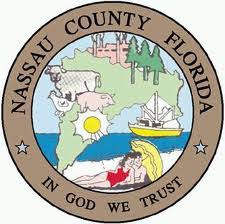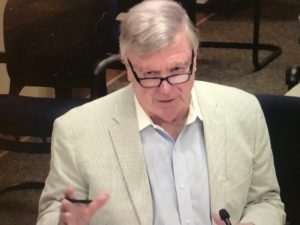 By Cindy Jackson
By Cindy Jackson
Reporter
June 18, 2020
An important item discussed in great detail at the June 17th meeting of the Board of County Commissioners was the CARES Act (Coronavirus Aid, Relief, and Economic Security Act).
This two trillion-dollar federal economic assistance effort was signed into law on March 27, 2020. Among other things, “The CARES Act provides $150 billion to help states, and populous cities and counties . . . cover unanticipated costs from the COVID-19 pandemic and its economic effects.”
From this pool of money, Florida distributed $2.5 billion to twelve counties with a population exceeding 500,000. Those twelve counties were Brevard, Broward, Duval, Hillsborough, Lee, Miami-Dade, Palm Beach, Pasco, Pinellas, Polk, Orange and Volusia. The conditions for receipt of those monies are succinctly spelled out on the U.S. Treasury’s website.
In addition to those monies, however, the state also received $1.2 billion for other local government entities. Unlike the monies targeted to counties and municipalities with populations exceeding 500,000, Governor Ron DeSantis did not immediately release funds destined for smaller communities, like Nassau County. It has been more than two months.
In response, the Nassau County Board of Commissioners joined with the Small County Coalition, the League of Cities and the Florida Association of Counties to impress upon the Governor that smaller counties also have dire needs as a result of the chaos and business closings brought about by COVID-19. To that end, on May 27th, 2020, the BOCC passed a resolution requesting distribution of the $1.2 billion.
However, unlike the rules that govern the monies distributed to the larger counties, smaller counties, like Nassau, must enter into funding agreements with the [Florida] Division of Emergency Management. According to a release issued by the Governor’s office, “Using a phased approach, the Florida Division of Emergency Management (FDEM) will distribute funds to the remaining counties, beginning with an initial disbursement of 25% of each county’s allocation.”

Another striking difference between two funding “pools” is the fact that that monies distributed to smaller counties will be “disbursed on a reimbursement basis,” said Mullin. Mullin emphasized that much of what is required by Florida’s smaller counties is much more cumbersome than what is required by monies released to Florida’s larger counties.
In fact, Manager Mullin delivered a virtual filibuster as he read from a sample draft agreement that outlined its laws, rules, regulations, policies and provisions.
At one point, Commissioner Thomas Ford said, “Pardon me for oversimplifying . . . but it seems like . . . if the money isn’t spent, , they [the state] got to keep it . . . the harder they make it . . . the more they get to keep,” to which Mullin responded, “Well said.”
On an up note, as pointed out by Commissioner Aaron Bell, is the fact that Nassau County is now slated to receive an initial $3.8 million as opposed to earlier reports of a lesser amount.
County staff were expected to attend a webinar conducted by the Florida Association of Counties later in the day.
The BOCC went on to approve by a 5-0 vote for the County Manager to draft a plan for the receipt and management of said monies.
Reached by phone early Thursday morning, the team of Mullin, Pope, Diehl and Robertson explained the enormity and complexity of the situation. The County will be in charge of dispersing the funds – not just to Fernandina Beach, Callahan and Hilliard but also to constitutional offices, the court system, the social service agencies and the list goes on. In so doing, Nassau County will be on the “hook” for these funds since it is disbursement-based reimbursement. In addition, while the County may receive tacit approval of its agreements with other entities, when it is all said and done, the State could decide that it is not going to reimburse for said activities and the same could be said for the federal agency overseeing CARES funding as well.
